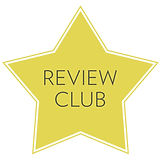

Positioning
In order to be able to compete against Amazon and other incumbents in the European market, BetterWorldBooks should provide an added value to its products and services compared to its competitors. In order to do so, it is important to provide a relevant value proposition that both fits the company’s culture and know-how but also the consumers’ needs and wants.
Firstly, the current value proposition of BetterWorldBooks will be summarised with the help of a value proposition canvas.
Secondly, we will provide an added value proposition customized to the European market with the help of the S.A.V.E. framework.
Current value proposition
The current value proposition of BetterWorldBooks articulate itself around 3P’s: Product, Planet, Profit.
They offer online selling services of both new and second-hand books. In addition, they offer an environmentally friendly and ethical product. Also, their automated services provide a list of book recommendation for their users, saving them thereby time and effort.
Their detailed value proposition is explained in the first part of this report. However, it can be summarized with the help of the value proposition canvas here below.
Added value proposition
Even though BetterWorldBooks currently provide an extensive and successful value proposition, it is clear that it can be improved and must be adapted to the European market. In order to do so, we will use the S.A.V.E. model. In addition, aiming at providing a competitive value proposition, we will make use of the Blue Ocean conducted in the analysis of the market.
In our market analysis, we conducted two types of Blue Ocean analysis. The first one compares Amazon and BetterWorldBooks while the second one compares online books selling and offline books selling.
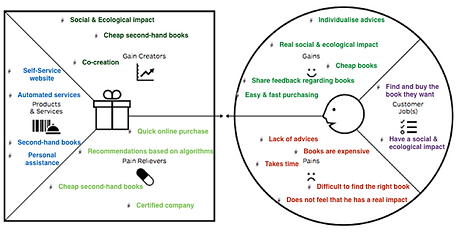
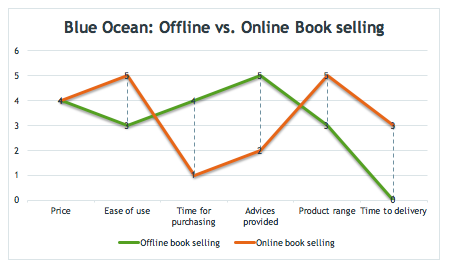
From these observations, we can note one gap that should be filled by BetterWorldBooks:
-
Advices provided: this gap will be filled with a system enabling customers to provide high quality reviews in exchange for points that they will be able to trade for discounts on the company’s books. This will be detailed here below.
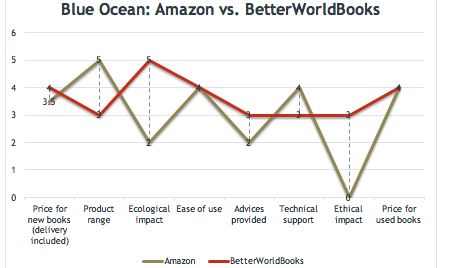
From this second “Blue Ocean” analysis, one can note the following gaps that should be filled:
-
Ecological & ethical impact: this gap will be filled through a newsletter service that will be detailed below.
-
Advices provided: see here above.
S.A.V.E. Canvas
From our previous market analysis and the Blue Ocean illustrated here above, we can make our added value proposition canvas with the use of the S.A.V.E. model. The decision to use the S.A.V.E. model is based on the fact that changes in the environment makes the 4P’s out-of-date. Indeed, according to Eduaro Conrada, Chief Marketing Officer for Motoral, “business owners should look to the S.A.V.E. framework instead of the 4P’s marketing mix, as they craft and define their unique offering” (BusinessModelsInc, 2014).
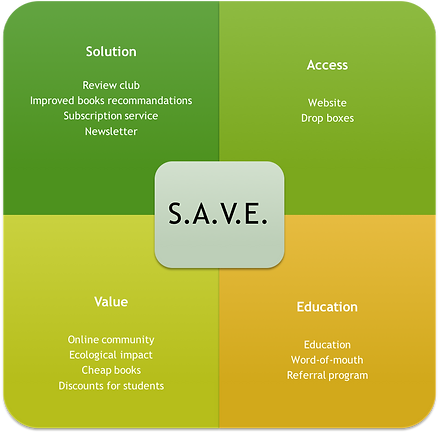
Solution
“We are continually faced by great opportunities brilliantly disguised as insoluble problems.”
Lee Lacocca, American Businessman, President and CEO of Chrysler Corporation from 1978 to 1992 (Decision Innovation, s.d.)
In order to improve our value proposition, we came to the conclusion that three services should be added to our product in order to solve customers’ problems spotted with the help of the Blue Ocean analysis.
First of all, a subscription service would enable the company to retain more customers and give them an incentive to buy their books through our distribution channel. This subscription service primarily aims at targeting heavy readers but also average readers. This service will consist in a monthly delivery of a given number (depending on the client’s choice) of selected and discounted books according to the consumer’s preferences with the use of the algorithms that BetterWorldBooks already uses. This will provide heavy (and average) readers with an easy and cheaper way to fulfil their reading hunger.
The second problem that should be solved is the lack of relevant and complete enough recommendations regarding books. Our proposal to solve this problem is to turn customers into co-creator through a review club. Thanks to a system of “points”, which clients will be able to exchange for discounts on the company’s books. In order to earn points, customers will have the possibility to write reviews on books they read. In practise, other customers would be able to “like” their reviews and each “like” would provide the author of the reviews with one “point”. In addition, every purchase on our website would give them one additional “point” per dollar spent on our books. Once they have gathered enough points, they will be able to exchange them for reductions with a limit of 20% per item with the following ratio: 1 point = 0,5% discount.
Finally, in order to target specifically ecological buyers, and in order to improve the feeling that our product has a real ecological and ethical impact, we will create a newsletter. This newsletter will be sent to every subscriber every month. It will give them an overview of the progress of our current ecological and ethical projects.
Access
In today’s environment, place has become irrelevant with the increase of online selling and Internet penetration. Therefore, companies should not focus on place but rather on access.
In order to target online consumers, it is important to focus on online access to our products and services. Therefore, a website should be created for every country (i.e. France, United Kingdom and Germany). This website should be user friendly and focus on the ecological aspect of the product. Also, customers should be able to create an account. This account will gather all their information, recommendation of books, points they gathered and will also provide them with a follow-up of their current orders.
Finally, the books donation should not be forgotten. In addition to partnerships with universities and libraries, drop boxes will be placed in strategic places (universities, offices, etc.) in order to increase access to donation possibilities.
Value
Even though price remains an important determinant, emphasis should first be put on value. What do we offer? How is this better than competitors? Many of our services were already described in the section concerning solution. However, our value is not limited to these services. The additional values we offer to customers are the following:
-
Online community: in order to specifically target heavy readers, we will create an online community. This online community will be similar to any social network but will be specifically designed for book readers. Among the features that will be included, users will have the opportunity to take part in online discussion about different books on forum and live chat, they will also be able to create “events” in order to meet “in real life” and discuss their experience about the books they read. Also, news will be regularly published about new publications, authors, etc. This online community will be directly accessible from our website and will be advertised on existing social media such as Facebook and Twitter.
-
Ecological impact: targeting ecological buyers, specific emphasis should be put on the ecological impact of the product. From our analysis, we gather that the ecological book market is (almost) inexistent in Europe. Therefore, we offer an ecological added value to consumers, which they can not find with any other competitors.
-
Cheap books: in addition to the ecological impact, we provide cheap (second-hand) books. Even though price is not the most relevant criteria, this will enable us to target price sensitive consumers and heavy readers who are willing to buy as many books as possible.
-
Discounts for students: in order to specifically target young people, we will offer discounts for students. Textbooks amount for almost 40% of the market and are mainly bought by students. Since these are expensive, we will provide extra discount for students. They will be able to receive this discount thanks to their university e-mail address.
Education
Rather than promoting a product, educating people provide customers with information relevant to their needs and wants. In order to educate our current and potential customers, three channels will be used:
-
Word-of-Mouth: first of all, we believe that word-of-mouth has a crucial role to play in promoting and educating people. Since we will be operating in a niche market, it is clear that word-of-mouth will play a major role in the education of people.
-
Referral program: in order to give our customers incentives to promote our company, we will create a referral program. Our clients will be able to have “referrals” and they will earn discounts for each book purchased by their referrals.
-
Book fairs: in order to educate people, we will be present at books fairs. Our presence will enable the company to promote its products and services and to meet potential customers.
-
Universities: in order to specifically target students, we will be present on the biggest universities. We will explain our products and services and offer them discounts.
-
Social networks: In addition to our website, social medias should be used to provide an increase promotion to our services thanks to a company’s Facebook page for example. A Twitter account should also be created in order to share the progress of the company’s ecological and ethical projects with its “followers”.
Pricing
Product pricing can be the most powerful tool in e-stores since it enables firms to capture mass consumers and therefore keep them in the long run as loyal customers by offering them different services and features.
In BWB’s case, special discounting strategy will be implemented in order to cope with the high competitive book market and thus gain ground within this market.
One should note that discount strategy is not sufficient to sustain a long-term clientele. This is why BWB offers many features to its customers besides discounts (review clubs, eco-newsletter etc.).
Bouncing back to the discount strategy, the following table shows the different categories of price deduction:
Subscription
A monthly membership will be proposed to heavy and average readers. This subscription will enable them to receive each month a collection of books based on the customers tastes and preferred genres.
Moreover, to encourage Heavy and Average readers to buy from BWB, the latter will provide them with special discounts (if you buy X books you get X% off on your next purchase). Focusing on a specific pricing strategy for small readers is a waste of time and resources since the former do not read on regular basis. Therefore, a discount would be superfluous in their case. Besides, in the targeting section it was clearly stated that small reader would not be targeted.
Review Club Discount
BWB will on the one hand enable buyers to create their own BWB profile and on the other hand it will let users submit reviews on books that they read beforehand. This technique is relevant especially because readers would rather consult a review about a book that they are willing to purchase. So BWB’s platform in this case is both the seller of the book and the referee to analysis concerning the book.
Moreover, to ensure the efficiency and the application of such a Club, BWB will assign to each review (and based on the number of likes and interactions with it) points that can be exchanged for discounts. This way, BWB ensures active interactions between users.. As it has been decided, 1 point will be equivalent to a 0,5% discount on a BWB product with a maximum of 40 points per product (in other words 20% discount per product by simply writing reviews and being interactive).
Student Discount
As it had been pointed out in the previous sections, young people represent an important segment for BWB and more precisely, the Textbook market. As it is a common fact, students are among low revenue residents and therefore are generally price sensitive. With the Student Discount system, BWB enables students to purchase important courses’ materials for their lessons and studies with a discount rate. The student must indicate that the buyer (him) is a student (for instance: a university email address of the student is sufficient).
Referral Program
This program is interesting to implement because it enables a tremendous growth of BWB’ network by a cooperation with buyers. In a nutshell, the referral program is a feature that helps BWB grow with the help and the dedication of its buyers. For example, Mister X has a BWB profile. Misses X signs up correspondingly for BWB and starts to purchase books online. When Ms. X has subscribed for BWB, the server asks her how she knows BWB. By saying that M. X was the one to tell her to join the BWB network and buy books from it, the former gets a discount for a ‘word-of-mouth’ mark.


